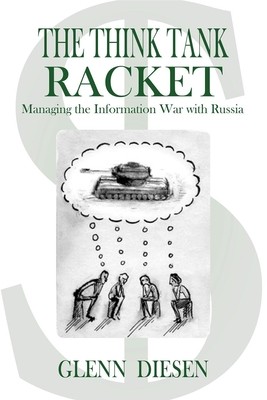
- We will send in 10–14 business days.
- Author: Glenn Diesen
- Publisher: Clarity Press
- ISBN-10: 1949762807
- ISBN-13: 9781949762808
- Format: 15.8 x 21.8 x 2.3 cm, minkšti viršeliai
- Language: English
- SAVE -10% with code: EXTRA
The Think Tank Industry and Perpetual Conflict with Russia (e-book) (used book) | bookbook.eu
Reviews
Description
How do think tanks influence Western policies toward Russia? The influence of think tanks in Washington has grown immensely over the past decades in terms of producing research papers, engaging with the media, and having their staff enter government.
The ideal purpose and appeal of think tanks are their ability to function as a bridge between academics, the media, the public, and decision-makers. Political decision-makers are expected to be experts across a wide area of governance which becomes increasingly difficult as the world becomes more complex. Acquiring advice and enhancing competencies through cooperation with scholars at universities can be challenging as academics tend to focus on narrow research questions that take place within a wider discussion of theory and method. Think tanks respond to this challenge as institutions that provide focused research studies and policy papers to address specific and current challenges.
The negative aspect of think tanks is the power they wield, from controlling information to functioning as a waiting room for politicians out of office. Information is power, and a think tanks business model has been established that sells political influence in Washington and manufactures consent among the public. The military-industrial complex is the dominant donor to think tanks, which results in a bias toward military solutions and perpetuating conflict.
Russia remains a leading adversary of the West and has sustained Washington's exorbitant military spending over many decades. Think tanks accordingly have a great incentive to push for a confrontational posture towards Russia as they operate in an industry where conflicts are profitable and peace produces losses A mutually acceptable post-Cold War settlement threatened the revenue of one of the largest and most influential industries in the US, which was reversed as a result of NATO expansion and renewed tensions with Russia.
This book explores how the think tanks function, and how their growing role has influenced US policies toward Russia.
EXTRA 10 % discount with code: EXTRA
The promotion ends in 22d.19:23:12
The discount code is valid when purchasing from 10 €. Discounts do not stack.
- Author: Glenn Diesen
- Publisher: Clarity Press
- ISBN-10: 1949762807
- ISBN-13: 9781949762808
- Format: 15.8 x 21.8 x 2.3 cm, minkšti viršeliai
- Language: English English
How do think tanks influence Western policies toward Russia? The influence of think tanks in Washington has grown immensely over the past decades in terms of producing research papers, engaging with the media, and having their staff enter government.
The ideal purpose and appeal of think tanks are their ability to function as a bridge between academics, the media, the public, and decision-makers. Political decision-makers are expected to be experts across a wide area of governance which becomes increasingly difficult as the world becomes more complex. Acquiring advice and enhancing competencies through cooperation with scholars at universities can be challenging as academics tend to focus on narrow research questions that take place within a wider discussion of theory and method. Think tanks respond to this challenge as institutions that provide focused research studies and policy papers to address specific and current challenges.
The negative aspect of think tanks is the power they wield, from controlling information to functioning as a waiting room for politicians out of office. Information is power, and a think tanks business model has been established that sells political influence in Washington and manufactures consent among the public. The military-industrial complex is the dominant donor to think tanks, which results in a bias toward military solutions and perpetuating conflict.
Russia remains a leading adversary of the West and has sustained Washington's exorbitant military spending over many decades. Think tanks accordingly have a great incentive to push for a confrontational posture towards Russia as they operate in an industry where conflicts are profitable and peace produces losses A mutually acceptable post-Cold War settlement threatened the revenue of one of the largest and most influential industries in the US, which was reversed as a result of NATO expansion and renewed tensions with Russia.
This book explores how the think tanks function, and how their growing role has influenced US policies toward Russia.


Reviews